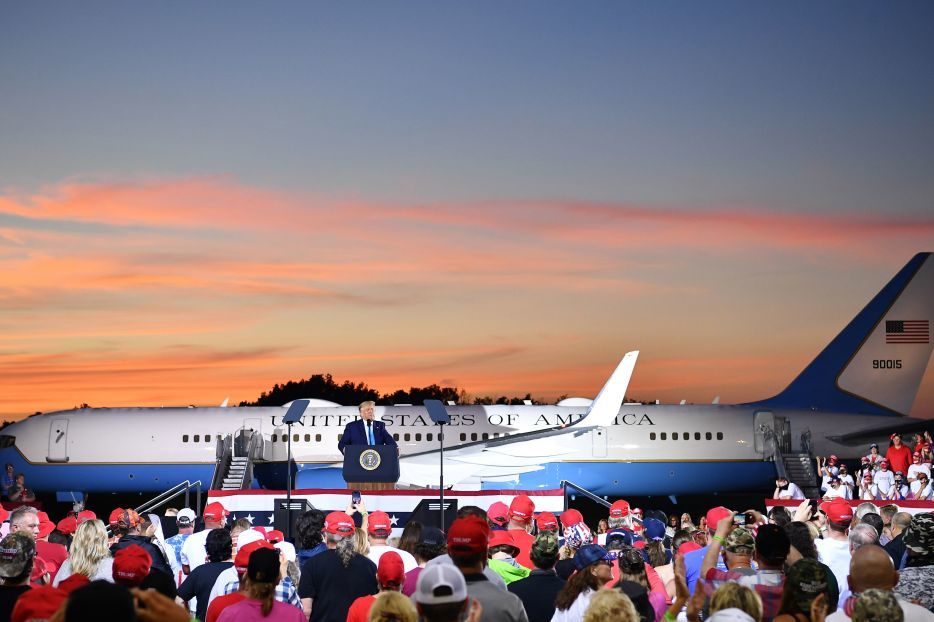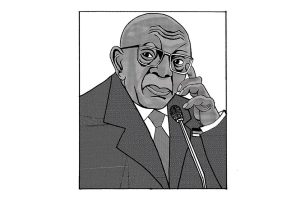Laramie, Wyoming
William Kristol, a Grand Poobah of neoconservatism, is leaving the Republican party to join the donkeys of the Democratic one. As Dorothy Parker remarked on being told that Calvin Coolidge had died, ‘How could they tell?’ Mr Kristol, of course, was never a Republican to begin with, only a conservative Democrat. Still, it is true that with Donald Trump’s election and ascendance to the Oval Office, the Republican party has changed considerably, at least for now. So has American conservatism.
Whether or not the GOP remains the party of Trump after he steps down from the White House or is dragged out of it by his gilded forelock, conservatism in this country will continue to be Trumpist, and probably for a very long time. That is a matter of profound political importance, as Donald Trump is Mr Conservative for the 21st century, a very different thing from his predecessor in the role of the second half of the 20th, Barry Goldwater. While the one is by no means an unalloyed improvement on the other, Trump certainly represents a necessary and inevitable adaptation of the role to another era.
Two decades ago, the late Dr Samuel Francis, an old-fashioned Southern gentleman and scholar with a doctorate in 18th-century British history, though no Christian, remarked to me in a wholly dispassionate manner in reference to the social, cultural and political themes still discernible in educated conservative discourse, ‘These ideas are dead. No one is interested in them any longer.’ These ideas included the importance of history to human thought and society; of cultural continuity, coherence and integrity; of discrete nations and efficient borders; of natural human inequality and social hierarchy; of federalism, political decentralization and subsidiarity. All have been eclipsed, Francis thought, by liberalism’s campaign to consign western history, western institutions, western culture and western power and influence to oblivion as chauvinistic, racist, colonialist, paternalistic and sexist ‘constructs’.
The liberals have been winning because their hatred of the West is entrenched at the highest and most influential levels of society and government, and because postmodern people, Americans especially, have three paramount interests that override all the others: technology, ideological politics and the way the other two can be harnessed together for direct political action. These obsessions rigorously exclude traditional learning and serious educational study; therefore, the intellectual sensibilities that formed the basis for the active conservative mind are absent today, seemingly without prospect of renewal.
Michael Oakeshott thought ‘conservatism’ essentially an attitude toward life. It is also a predisposition toward the infinite, a perception that truth is a metaphysical reality; that, being eternal and unchanging, its precepts have a moral claim to recognition, respect, honor and observance in human thought and action. This disposition, too, appears largely to have vacated the culture of the postmodern west generally, the United States in particular.
The conservative impulse remains strong at the popular (the so-called ‘populist’) level of society. It denotes, however, a reflexive and instinctive conservatism that lacks both an intellectual foundation and an intellectual framework, things it is unlikely to acquire in the imaginable future. Thus, what will likely pass for ‘conservative’ thought in the coming decades will be emotional, reactive, and aggressively non-intellectual — even anti-intellectual. Or perhaps the proper term is popular-intellectual; Aristotle, Burke, Oakeshott, Weaver will mean nothing to it. And it will persist in its anti-establishmentarian prejudices, since liberalism shows every sign of surviving as the ruling ideology for another generation or two at least, while liberals remain the ruling class — or caste — in the west, directing and dominating all the major institutions from politics and economics through education and the arts. By definition, then, the anti-liberal opposition will continue to be demotic and anti-theoretic, impatient with and scornful of ideas, in public life especially.
The development of populist conservatism will run parallel to the continued advance of postmodernism — urban and metropolitan, technocratic, scientific and scientistic, mass-oriented and mass-organized, futuristic, ruthlessly secular and relentlessly hostile to rural and small-town life and people. As the values that have historically underlain the conservative temptation are ignored and displaced, so conservative political philosophy will be superseded by something far less intellectually sophisticated, respectable and genteel and much more resentful, angry and aggressive, foreseeably to the point of violence.
In The New Class War: Saving Democracy from the Managerial Elite, Michael Lind concedes that the meritocracy has so far proved itself unwilling to sacrifice any of its wealth and power to those who lack both, but he thinks that fear — and only fear — of a populist revolt from below that would dispossess them of their present advantages will suffice to make them face political realities. Whether one side or the other — or neither — prevails in the end, the American society of 2020 is going to take a very long time, decades at least, to sort through its problems and reach some kind of political and social accommodation. Meanwhile, so far as conservatism of any kind has a role to play in the process, it will be a populist conservatism: the popular, anti-theoretic conservatism of Donald Trump and the anti-liberal politicians in the same mold who succeed him. Short of civilizational disaster that brings down the industrial and post-industrial worlds and returns us all to the pre-industrial life that preceded them, the circumstances that might allow for the renewal of premodern insecurities — starting with the fear of God — are unlikely to return, and with them a sane philosophy of civilization and a sane metaphysics to support it.
This article is in The Spectator’s September 2020 US edition.


















